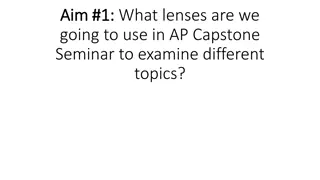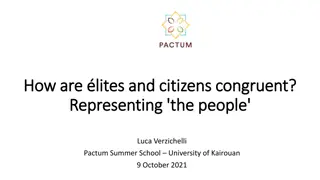Analysis of Direct Democracy vs. Representative Democracy Features
In this academic guide, the focus is on analyzing and comparing key features between direct democracy and representative democracy. The essay structure, paragraph breakdown, and example paragraphs provided offer a framework to evaluate the strengths and weaknesses of each democratic system. Through detailed analysis, the aim is to determine which system may be superior based on specific factors and considerations.
Download Presentation

Please find below an Image/Link to download the presentation.
The content on the website is provided AS IS for your information and personal use only. It may not be sold, licensed, or shared on other websites without obtaining consent from the author. Download presentation by click this link. If you encounter any issues during the download, it is possible that the publisher has removed the file from their server.
E N D
Presentation Transcript
20 mark Question basically will ask if one system is superior to the other The question will dictate which features you use to structure your paragraph!
Mark Breakdown Intro 2 Knowledge 8 (max 5 for only description or only examples) Analysis 6 Conclusion 4 (separate or throughout)
Essay guidance This essay will focus on analysis of one type of democracy This means your will discuss one feature of direct and counter it with a feature of representative Therefore you must be clear before you begin your paragraphs, which you are arguing is best as your mini conclusions should back this up Your final conclusion will then look at the mini conclusions to make a final judgement
Paragraphs combine a feature of DD and contrast with RD DIRECT DEMOCRACY 1. Heightens control 2. Politicises citizens 3. Don t have to rely on self- serving politicians 4. Ensures legitimacy REPRESENTATIVE DEMOCRACY 1. Is more manageable/ practicable 2. Creates a Division of labour 3. Provides experience and expertise 4. Ensures accountability. Stability and compromise
Intro Background what is democracy/ how does it work/ type of system/ describe direct & representative democracy Factors - ^^ Political Theorists have identified a number of benefits of direct democracy such as (list) Argument It can be argued that the benefits of direct democracy ARE/ ARE NOT far superior to those for representative because (justify)
Paragraphs Paragraph Structure 1. Topic sentence One key feature of direct democracy is 2. Knowledge Describe the feature in detail 3. Example use an example that backs this up 4. Analyse Therefore it can be argued that direct democracy 5. Comparison In contrast, it can be argued that Representative democracy (now repeat steps 2-4 for this feature 6. Mini conclusion Overall, it is clear that the direct/ representative democracy is superior because.. (provide Highly detailed evidence to support) You must include a Theorist's view in at least two paragraphs!
Example Paragraph One key feature of direct democracy is that it heightens control. This means that citizens are directly involved in decision making on matters which directly affect them and therefore those participating in this purest form of democracy are ultimately shaping their own destiny in regular participation in voting directly on matters which concern them. For example, in 2014 Scottish citizens were able to directly participate in deciding Scotland s future when they participated in a referendum on whether Scotland should be an independent country, this was seen as too important a decision to be taken by representatives. Therefore it can be argued that direct democracy is advantageous because it allows citizens to have a direct say in matter which affect their daily lives. In contrast, It can be argued that Representative democracy is more manageable and practicable in a modern democracy like the UK where it is not seen as realistic to consult an electorate of 45 million citizens on every issue that concerns them. For example, in Ancient Athens it is estimated that only around 40,000 males participated in Direct Democracy due to the small scale of the city compared to present day so direct democracy was a more realistic possibility in Ancient Greece. Therefore it can be argued that representative democracy is far more manageable and feasible when presented with a large electorate and it is not realistic to ask citizens to vote regularly on every matter which concerns them. Theorist Joseph Schumpeter considered representative democracy a credible solution to the problem of most people simply not having the time or expertise to be able to continuously engage in complex political debate. Overall, it is clear that representative democracy is superior because although direct democracy can give citizens more direct influence in decision making it is completely impractical to involve every citizen in a large modern state in every decision made which affects them. Direct democracy is unworkable and unmanageable in most modern states today due to the number of adults enfranchised. In the USA for example more than 146 million voters are registered and it is not feasible to involve every one in decision making directly, although it may be more workable in smaller areas such as New England townships.
Conclusion 1) In conclusion, it is clear that both Direct and Representative democracy offer advantages to citizens. 2) On the one hand (summarise advantages of direct democracy here) On the other hand (summarise advantages of representative democracy here) 3) Overall, it is clear that the benefits of _____ democracy are far superior because . This is also the case because Therefore it is clear that ______ democracy is superior.


